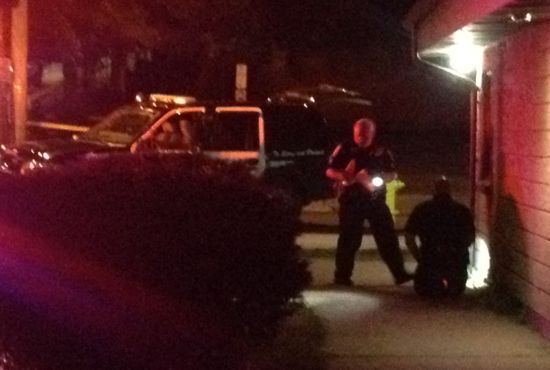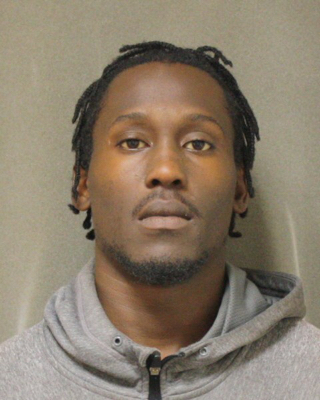 Kevin Boyd was afraid for his life the night of Aug. 5, 2015, his lawyer told a judge.
Kevin Boyd was afraid for his life the night of Aug. 5, 2015, his lawyer told a judge.
A man had threatened him with a gun several times that week. So when he heard someone shout “Do him!” during a fight involving the man in front of an Ansonia convenience store, he reached for his own gun and pulled the trigger.
For that, he’ll spend the next eight and a half years in jail — but the man he shot will spend the rest of his life in a wheelchair.
It was a “classic example of what happens when people who should not have guns on the street have guns on the street,” Superior Court Judge Frank Iannotti said Thursday.
“But that’s what keeps happening,” the judge said. “And lives are altered and changed forever.”
Background
Boyd and the victim, a 21-year-old Bridgeport man, didn’t know each other prior to the shooting, according to interviews police summarized in Boyd’s arrest warrant.
But Boyd, a Shelton resident, had landed himself in hot water for talking to a sister of one of the victim’s friends.
The victim and his friends ran into Boyd and a group of his friends outside the Ansonia Mini Mart. The convenience store is at North Main and Fourth streets, a busy intersection with a strip mall.
There were many people nearby at the time, including a woman and her young child.
The victim and Boyd’s older brother began arguing, and the victim was allegedly shot as he was fighting with Boyd’s sibling.
Boyd shot the man in the torso and leg. One of the bullets hit the man’s spine. He’ll never walk again, according to prosecutor Cornelius Kelly.
Boyd faced between seven and 10 years behind bars at Thursday’s sentencing after pleading guilty to first-degree assault and carrying a pistol without a permit.
Victim Paralyzed
In court Thursday, Kelly said that Boyd eventually “did the right thing” and fessed up to the crime after two run-ins with police during which he gave cops names different from his own.
“I have a sneaking suspicion that this case would not have been solved but for the … guilty conscience of Mr. Boyd,” he said.
Boyd was charged in the shooting Oct. 1, 2015 and has been behind bars since.
The prosecutor said it was hard to square Boyd’s confession with his rash conduct the night of the shooting.
“Obviously this victim’s life has been forever changed,” Kelly said.
The man Boyd shot told probation officials he planned to attend the sentencing, but wasn’t in court Thursday. Kelly said he reached out to the man several times while negotiating the plea bargain without success.
“He really did not want to be involved in the process,” Kelly said.
 ’I Know Better’
’I Know Better’
Boyd’s lawyer, Catherine Brennan, noted he had no prior criminal record.
“Mr. Boyd acted impulsively and it was a big mistake that he’ll regret,” she said.
She said Boyd worked two jobs to support his family after his mother became ill and died in 2011. She produced letters of support from a neighbor and Boyd’s high school basketball coach.
One of Boyd’s sisters told the judge that Boyd will turn his life around when he eventually gets out of prison.
Given the chance to speak, Boyd apologized to the victim and his family, as well as his own loved ones.
“I know better and should have handled my emotions more intelligently,” he said. “This is a lesson learned the hard way. I will take everything from this situation to never put myself in this predicament ever again.”
Why?
The judge agreed with both lawyers that Boyd deserved credit for confessing to the crime, and for leading a pretty good example for most of his life.
But that just made his decision to use a gun all the more baffling, he said.
“Why young men put guns in their hands that they have no right to have and no reason to have I don’t think I’m ever going to be able to understand,” Iannotti said. “Nothing good is ever there on the bottom line. The bottom line always ends up being a disaster, a catastrophe.”
He told Boyd to use his time in prison to reflect on how the man he shot will spend the rest of his life.
“I can’t imagine how he feels, and I hope there’s something going through your mind that’s really bothering you, because it should,” the judge said. “Whatever sentence I bestow upon you today, when you complete it and the prison doors open, you’re going to be walking out. He’s never walking again.”
During his first five years out of prison the judge ordered Boyd to perform 25 hours of community service per year serving the disabled.
The judge told Boyd he’s lucky not to be facing a murder charge before handing down the sentence — technically 16 years to be suspended after Boyd serves eight and a half.
“The young man didn’t lose his life, but he lost what the rest of his life will be like,” Judge Iannotti said.